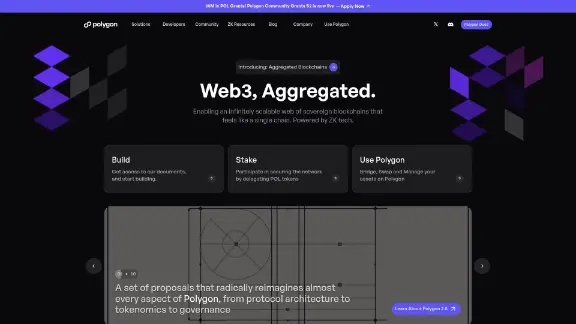Polygon (MATIC)
Polygon, initially launched as Matic Network in 2017, is a framework designed to build and connect Ethereum-compatible blockchain networks. Founded by Sandeep Nailwal, Jaynti Kanani, Anurag Arjun, and Mihailo Bjelic, Polygon addresses blockchain challenges like high transaction fees and slow processing times while maintaining security. It achieves scalability through the use of sidechains for off-chain computations, leveraging the Plasma framework and a decentralized network of Proof-of-Stake (PoS) validators. As of August 2022, over 37,000 decentralized applications (dApps) have been developed using Polygon's architecture.
Evolution and achievements
Originally launched as Matic Network, the project was rebranded to Polygon in February 2021. This transformation marked the beginning of a multi-faceted approach to Ethereum scaling. Polygon aims to create a multi-chain ecosystem that benefits from various Layer-2 scalability solutions like zkRollups and Optimistic Rollups, alongside its main PoS chain. Polygon is often described as the Swiss Army knife of Ethereum scaling and infrastructure development.
In June 2023, Polygon introduced Polygon 2.0, a vision to enhance Ethereum's scalability through interconnected zero-knowledge-powered Layer-2 chains. The network update includes three Polygon Improvement Proposals (PIPs) focusing on protocol governance, system smart contract governance, and community treasury governance.

| Ticker | MATIC |
| Category | Smart Contract Platform |
| Website | https://polygon.technology/ |
| @0xPolygon | |
| Telegram | polygonofficial |
| https://www.reddit.com/r/maticnetwork/ | |
| Contract Addresses | |
|---|---|
| ethereum | 0x7d...b0 Copied! Copied! |
| moonriver | 0x68...d8 Copied! Copied! |
| harmony-shard-0 | 0x30...c5 Copied! Copied! |
| moonbeam | 0x34...45 Copied! Copied! |
| energi | 0x98...36 Copied! Copied! |
| sora | 0x00...77 Copied! Copied! |
| binance-smart-chain | 0xcc...bd Copied! Copied! |
Recent developments
Recent updates include the introduction of the zkEVM, a Layer-2 protocol that enhances scalability and security while maintaining Ethereum Virtual Machine (EVM) compatibility. The first major upgrade of Polygon zkEVM, the Dragon Fruit or ForkID5, was deployed on Mainnet Beta in September 2023, marking a significant milestone in Ethereum Layer-2 solutions.
In September 2023, Polygon collaborated with Mirae Asset Securities to develop a tokenized securities network and launched a new developer toolkit, the Chain Development Kit (CDK), to support the creation of customizable Layer-2 chains.
Technology behind Polygon
Polygon's architectural framework
Polygon's architecture comprises a four-layer system: the Ethereum layer, security layer, Polygon networks layer, and execution layer. The Ethereum layer involves smart contracts that handle staking, transaction finality, and communication between Ethereum and Polygon chains. The security layer provides additional validation services to enhance security for the chains.
The mandatory Polygon networks layer consists of blockchain networks within the Polygon ecosystem, each responsible for its consensus and block production. The execution layer hosts Polygon's EVM implementation, facilitating the execution of smart contracts.
Polygon employs several technologies, including:
- The PoS Chain, an Ethereum sidechain known as the Matic PoS Chain, offering a Proof-of-Stake security layer.
- Plasma Chains, leveraging Plasma technology for asset movement between Ethereum and child chains.
- ZK-rollups, which bundle numerous off-chain transactions into a single transaction using zero-knowledge proofs.
- Optimistic rollups, facilitating quick transactions with fraud-proof mechanisms.
Google Cloud's involvement
In September 2023, Google Cloud became a validator node operator on the Polygon PoS blockchain network, joining a decentralized validator group responsible for securing the platform. Polygon's network now benefits from Google's infrastructure, enhancing its security and reliability.
Use cases and applications
Payments and financial services
Polygon's platform enables decentralized applications (DApps) to expedite payments through APIs and SDKs for near-instant settlement. It supports Ethereum and ERC-20 token payments, cross-chain token transfers, and fiat-based payment systems, fostering an efficient payment ecosystem.
Gaming and collectibles
Polygon's Layer-2 scaling solution enhances blockchain-based gaming performance, reducing transaction latency. This improvement supports the growth of the blockchain gaming industry, especially with the rise of Non-Fungible Tokens (NFTs). Popular gaming and NFT dApps like Aavegotchi and Neon District have leveraged Polygon for improved user experiences.
Other applications
Polygon aids decentralized exchanges (DEXs) in offering faster and cost-effective trading by enabling quick settlement times. It also facilitates cross-chain atomic swaps and provides a foundation for open identity frameworks in dApp design.
Key projects and partnerships
Notable projects
Some of the 37,000 dApps utilizing Polygon include QuickSwap, IQ.wiki, Aavegotchi, Frax Finance, and Decentral Games. These projects showcase Polygon's versatility in supporting various applications, from DeFi platforms to gaming and prediction markets.
Strategic partnerships
Polygon has formed partnerships with several high-profile companies, including:
- Disney: Selected for Disney's Accelerator program to develop new storytelling technologies.
- Mercedes-Benz: Collaborated with Daimler South East Asia to create Acentrik, a decentralized data-sharing platform.
- Starbucks: Partnered to develop Starbucks Odyssey, a digital collectible loyalty program.
- Nike: Launched a Web3 platform offering Polygon-based NFTs for virtual apparel.
- Google Cloud: Engaged in a multi-year partnership to expedite the adoption of Polygon protocols.
MATIC token and upgrades
Overview of MATIC
MATIC, an ERC-20 token running on the Ethereum blockchain, is used for payment services and as a settlement currency within the Polygon ecosystem. Initially sold in private and launchpad sales, MATIC tokens are distributed among team, advisors, network operations, foundation, and ecosystem allocations.
Upgrade to POL
In July 2023, Polygon Labs proposed upgrading MATIC to POL, a native token for Polygon. POL, with an initial supply of 10 billion tokens, aims to support validator incentives and community treasury. The migration from MATIC to POL will occur at a 1:1 ratio, with the intention for POL to replace MATIC entirely.
